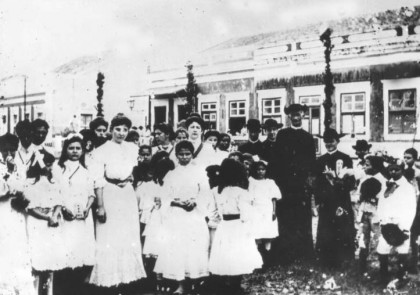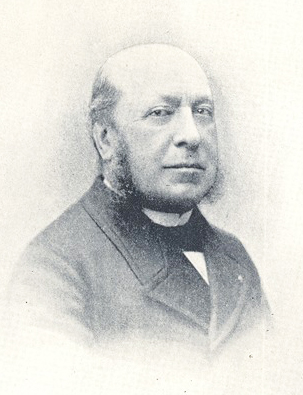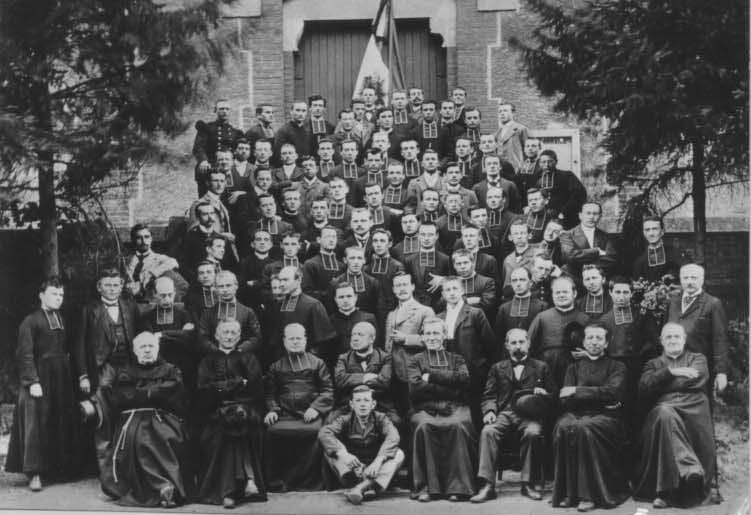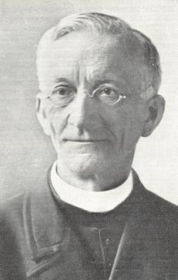the great question of our time, the social question, whose solution is dependent on faith, reason, revelation, and natural and Christian morality...
Fr. Dehon and “The Social Question” (Part 1)
|
We don’t seem to use the phrase “the social question” anymore, which is telling. Apparently there’s no longer any question that the Church should be concerned about social issues and the social life of society, nations, and the world – though there is certainly no agreement about what she should do about it. In Leo Dehon’s day, the social question was huge and much debated, for many reasons.
All of France was traumatized by political turmoil in the wake of the French Revolution, and the working class was further stressed by the ongoing Industrial Revolution. Within the Church, there were many who felt that society needed to go back to, if not monarchy (though many were royalists), a policy in which the Church had more influence and control over society. A Cardinal at the time spoke of their “profound conviction that politics is completely powerless to heal the ills of the country” and insisted “the causes of these ills are moral and religious.” To the pauperized[1] working class, these churchmen offered the hope of Heaven but not much else. Leo Dehon, a son of privilege, came of age during what his biographer Giuseppe Manzoni calls “the long imperial celebration” of Napoleon III, which resulted in an eighteen year “strange marriage between the church and the corrupt materialistic empire.” Ascendant in church leadership were absolutists, who wanted to use force to combat error. Yet there were also voices that argued for democracy, rejecting alliances with the powers that be, and freedom of conscience. Dehon himself was not won over to the side of democracy until he read Pope Leo XIII’s famous encyclical Rerum Novarum (On the Rights and Duties of Capital and Labor). Republicans[2] regained power just before Dehon came to his first parish, and anti-clericalism, and even persecution of the church, became common into the next century. A triumphalistic Church that was allied with the rich and powerful had become a persecuted sect in a radically secular society. It was at this moment that the recently ordained Fr. Dehon arrived in the city of Saint Quentin[3], in 1869. The parish of St. Quentin was huge, taking in nearly the entire city. The great majority of its members never saw a priest. Dehon lamented that “you can’t make the cities Christian when you have parishes of 30,000 souls.” Nonetheless, writes Perroux, in his first six months, young Fr. Dehon “gave his whole heart and much of his time to getting to know people through personal contact….” He followed the admonition of noted French ecclesiastic Bishop Dupanloup: |
|
If I had one piece of advice to give to Christians and priests of our day, it would be not to remain strangers to social questions, as has so often been the case. Get involved in the lives of farmers and workers, learn about their living conditions, their food, their salaries, their children and the elderly, their mutual aid societies, what they read and what they do in their spare time. Why? My God, in order to care for them, to instruct them, and to improve their circumstances!
|
|
Godless capitalists are exploiting the worker and are destroying his body, his soul, and his eternity… often without giving him an adequate share of the profits earned by his sweat…. This society is rotten and all the workers’ claims are well-founded. The current regime is evil, unjust, and a menace to society.
|
|
The sermon earned him a reprimand from his pastor, and decades later Dehon reflected that he shouldn’t have given it, or at least used the tone he did. But it showed the depth of his compassion for the poor and passion for justice.
Andre Perroux, SCJ, explains that after “a somewhat sheltered life” prior to this assignment, |
|
he lived in close proximity to the harsh conditions of the workers, especially those in the textile industry: for starvation wages a man worked on average 14 hours a day, a woman worked almost as long, and children as young as six years old worked 12 to 13 hours for even less pay. Father Dehon denounced this exploitation and the absolutely inhumane working conditions which were creating a wider gulf between the classes.
The inadequacy of the official Church response to this significant challenge pained him deeply: ‘A mistaken pastoral approach is hindering the progress of the Church.’ He was keenly aware of the shortcomings of a purely ‘moral’ approach which consisted of telling people to accept their fate or fulfill their obligations or increase their charitable donations. He was incapable of shrugging his shoulders or folding his arms in the face of the suffering and injustice that oppressed the poor or the ill-considered policies which led to disastrous consequences. With eyes wide open, he analyzed and assessed situations and, without counting the personal cost, he got involved. |
|
In 1874, as secretary for the diocesan office for the apostolate, Dehon surveyed pastors and found a profound sense of discouragement. “The number of responses was depressing. Practically nothing existed in the line of associations.” He concluded that “by excluding religion from political and social life we have alienated first of all the men, and then almost the entire populace.” Over the next three years, his participation in Social Congresses and the general assembly of workers’ circles in Paris convinced him that “we had to create an entire social awareness.” The charitable works of the Church were “fragile and insufficient because they did not attack the roots of the problem. The overall organization of the economy was a violation of the natural law.”
By 1877, however, Dehon’s passion to found a religious congregation would take priority over his social involvement, and would consume him through the end of the 1880’s. Morello notes that |
|
the social aspect was absent from the original plan for [Dehon’s) foundation [but] after a year of reflection, he believed that this aspect could very well be taken up by the constitutions of his congregation. He discovered and was able to penetrate the deep significance of the Gospel term, Kingdom of God. These words sum up very well his spirituality of interior liberation based on the love of Christ. Thus was born the idea of a social journal. Thus began his activity as a writer which would necessarily put him in contact with the entire social and democratic movement of Catholics.
|
|
About those early writings, Morello adds:
|
|
There is a rather spiritualist concept of life and society which emerges from the first articles… correct and true, but insufficient for understanding the real processes which determine social and political behavior. These too general principles, though solidly based, can easily have various meanings attached to them and can be reduced to ineffectiveness by the dominant ideologies.
… It is a vision of society which is too schematic and intellectual, reducing everything to a battle of two elites, the one good and the other evil, with each wanting to lead and direct society. [It] runs the risk of forgetting the real society, the majority of human beings who live with us every day. One forgets the common realities, which are also the truest and broadest. In particular, there is little respect for the dynamism and upward struggle of the people, for the culture of the largest strata of the population who, ultimately, form authentic society. |
|
Dehon's social vision would not come to maturity until the the 90's, with the publication of Rerum Novarum.
FOOTNOTES: [1] P.J. Maguire notes in “The Rise of Social Catholicism in the 19th Century” that “pauperism” is a specific type of poverty: a “systemic condition in which working men and women are no longer able to maintain the minimal requirements that are essential for human survival.” [2] Supporters of democracy, not to be confused with the US political party. [3] The largest city of the district of Aisne in the Picardy region of northern France, and heavily industrialized. |
Fr. Dehon and “The Social Question” (Part 2)
|
Christ, the benefactor of society, is held up by them as the enemy. Open warfare has been declared on him. He is pursued, hunted, chased from the schools, from the hospices, from the courts, from the cemeteries. They would like to erase all mention of him from legislation and diplomacy. They would even like to remove Christ from history and literature.
|
|
Two issues later, he turned to the struggle of workers and acknowledged the inroads made by socialism:
|
|
The Revolution overturned the Christian mode of living for laborers. It reduced the influence of the Church and curtailed the faith of the worker and of those who employ him. The people are agitating to rediscover an equilibrium. The socialists proposed some useful measures, but on balance they have as their criterion of validity only the opinion of the crowd, changing, ignorant, and emotional; and as their means of action, they have only violence and strong-arm tactics.
|
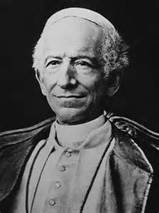 Pope Leo XIII Pope Leo XIII
While noting that The Church will be the “main factor in the recovery,” because it alone “has the full concept of justice and the secret of charity” without which “the lower, suffering classes will not make the best of their fate, nor will the wealthy and powerful be disposed to lend their aid to the disinherited,” he insists that the State and private initiative must also contribute. Government must legislate rest on Sundays, regulate the work of women and children in factories and night work, reform inheritance laws and encourage workers' guilds and insurance. Business needs to “attend to the moral well-being as well as to the temporal well-being of their workers… assist in works of moral teaching, education, relief, and insurance funds. They must unite with their workers in cooperative associations.” Finally, workers themselves must take initiatives and have their contributions valued.
In the December 1889 issue of The Reign, he again condemns socialism, which “represents the overturning of the order established by God.” Religious faith and socialism he sees as “mutually exclusive expressions.” Only “religion, and Catholicism in particular have enough authenticity to wrest [the worker] away from the seductive hopes of socialism.” However, while the Church has an “essential role [in stopping] the rising wave of socialist democracy, its efforts must be protected against heartless and pitiless exploitation by capitalism. It is incumbent upon the State to come to its aid through legislation protecting labor.” In July 1891 there appeared an article in The Reign entitled “The Encyclical of May 15 on the Social Question.” That was Rerum Novarum, the “long-awaited” and “longest…yet” teaching from Leo XIII on the rights and duties of capital and labor. Dehon quotes the Pope’s statement of the problem and its solution, and adds his own summary of what created the problem: |
|
"The problem is not easy nor free from danger, but it is necessary, through prompt and effective measures, to come to the aid of the lower classes," which as a result of the destruction of the old guilds which protected them; and as a result of unbridled competition, of stock speculation, of the concentration of labor and wealth in a small number of hands, are in a state of "undeserved wretchedness."
|
|
Dehon approvingly notes the Pope’s “refutation” of socialism as a solution, as well as his insistence that
|
|
"A major error is the belief that the two classes are natural enemies. Each has a driving need for the other; there can be no capital without labor, nor labor without capital. The whole thrust of religious truths concerning the economy concerns the rapprochement between rich and poor, by reminding them of their reciprocal duties and, above all, those of justice (his emphasis). The rich and the employers must not treat the worker as a slave, but must respect in him the dignity of man and that of the Christian. Work, far from being shameful, brings honor to a person. What is shameful is to use a person like a cheap instrument."
|
|
To this Dehon adds that “the truth is social harmony, not antagonism,” a principle to which he would adhere for the rest of his life. He also stresses the papal declaration that “labor is the sole source from which the wealth of nations comes.” What were Dehon's other "take-aways" from the encyclical? A few other quotes illustrate what he saw as of central importance:
|
|
"The State must particularly make itself the protector of the weak and the poor."
“Wages must not be insufficient for the worker's subsistence at a moderate level. If he accepts harsher conditions out of necessity, it is a serious injustice." "All of the works which are appropriate for relieving poverty and reconciling the classes...help remarkably in the solution: societies for mutual aid and assistance in case of accidents, organizations for children and adolescents, and (especially) workers’ guilds, which in themselves embrace almost all kinds of works." (again, his emphasis) |
|
FOOTNOTES:
[1] Former French military men and staunch royalists, but also well-intentioned social reformers. [2] Still to come were struggles with two unsympathetic bishops, leading to what he called the “Consummatum Est” (the four month suppression of his congregation by Rome in 1893-4). |
Fr. Dehon and “The Social Question” (Part 3)
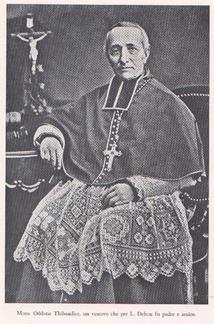 Bishop Thibaudier Bishop Thibaudier
In 1889, his superior, Bishop Thibaudier, told Fr. Dehon
that his young congregation would have to merge with a more established one,
and that he would have to leave St. John College. Dehon was devastated by this second
“Consummatum Est” (“It is finished”), delivered
by the same man who had approved this work.
The order to leave the college was rescinded two days later, and
attempts to find a congregation to merge with foundered. Then in 1890, a new diocesan shepherd, Bishop
Duval, arrived who was even less sympathetic to Fr. Dehon and his young
congregation. He pushed Fr. Dehon to
give up the running of St. John’s, and in 1893 Dehon reluctantly agreed. In the midst of all this, as well as internal conflicts in the congregation itself, he
remained obedient to God’s will, humbly offering his “Fiat!” (“Let it be
done!”) to whatever might come.
However, once freed from the direction of St. John’s and involvement in the St. Joseph Youth Club, Fr. Dehon was able to devote himself more fully to the social apostolate. His continued to honor Pope Leo XIII’s request to “preach my encyclicals” through his magazine “The Reign of the Sacred Heart in Souls and Society.” In a November 1892 article entitled “Democracy and the Sacred Heart,” Dehon reflected on the promise of “liberty, fraternity and equality” that had accompanied the French Revolution. While acknowledging “some generous measures” that helped the lower classes, he castigated the “explosion of hatred and folly; massacres, pillage, general ruin, the suppression of all charitable works and institutions, endless war and utter misery” that also followed in its wake. Noting that “some generous Catholics had believed that it was possible to reconcile the Gospel with socialism,” he reminded his readers that the pope’s encyclical had made clear the “fatal errors” of that doctrine. “The true solution,” he wrote, “lies in the practice of justice and charity. The rich person must not forget that he is only a trustee of his goods in the eyes of God and that he must give those whom he employs a fair share of the fruit of their labor,” as well as acting “in an affectionately paternal way towards them.” At the same time, he adds pragmatically: “Nothing prevents us from meeting with the socialists for a multitude of useful reforms for which they have, indeed, most often borrowed the first idea from us.” Despite his opposition to socialism, however, Fr. Dehon had evolved into a committed democrat, unlike most of his contemporaries in the French Church. He did not share the view of de Mun and many French bishops, called “Intransigents,” that the church must destroy the Revolution unless she wants to be destroyed by it. Instead, he adopted the view of Pope Leo, who while personally preferring the monarchy, wanted to seek an accord with the increasingly anti-Catholic French Republicans. The pope had previously asked de Mun to abandon his plans for a Catholic party in opposition to the Republicans, and had recently resisted the overtures of the Boulangerists.[1] In 1892, after many Republicans had begun to consider a more tolerant policy toward the church, Pope Leo had issued a letter stressing that the Church is not bound to any political regime and accepts legally constituted governments, whether monarchies or republics, in order to work together for the common good. Further, the duty of Catholic citizens is to work within the framework of the legal order to pass just laws and repeal unjust ones. Pope Leo stated things even more clearly in a letter to the French cardinals later that year: Anyone who regards political party, no matter how worthy its cause, as more important than the defense of religion, is promoting the politics of division and conflict rather than the politics of unity, which is in the best interest of religion as well as the common good. He urged France to follow the example of the United States. “There, freedom is truly the basis of the relationships between civil power and the religious conscience.” But while the majority of French Catholics, both lay and clergy, gradually came to accept the existence of the Republic, they never fully embraced the spirit of reconciliation and moderation at the heart of the pope’s directives. They found his policy of rapprochement hard to accept and failed to see that he was attempting to heal the breach between the Church and the new society which reflected a coming new world order. But neither his royalist leanings nor Republican persecution of the Church kept Fr. Dehon from openly supporting Leo XIII’s policy of rapprochement. In the July 1892 issue of his magazine, he had written: “Leo is clairvoyant when he declares that the future belongs to democracy.” In the January 1893 issue, he summarized the views of the Intransigents and the “friends” of the Pope’s policy, concluding that “both groups are acting in good faith and want the Church to win.” But “who is right? Undoubtedly the pope and those who follow him. We want to share the pope’s hopeful outlook.” In 1892, Bishop Duval convened a Commission for Social Studies in the diocese of Soissons. In June of 1893, after seeing his competence as a member in its first year, Duval offered Dehon the presidency of the commission, and Dehon accepted. The commission’s first task was the development of a manual of the principles of Catholic social doctrine, along with practical solutions to contemporary problems. A collaborative effort featuring contributions by La Tour du Pin and others, this “Christian Social Manual,” which was first published in August 1894, featured chapters by Fr. Dehon on Freemasonry and Judaism, and Socialism and Anarchy. He also wrote an appendix on the Circle Movement and most of Part II on practical solutions. The manual went through several further editions between 1895 and 1910, exposing tens of thousands to Catholic social teaching. In 1898, he published another major work, “The Social Catechism,” meant as a practical, popular text for priests in ministry. 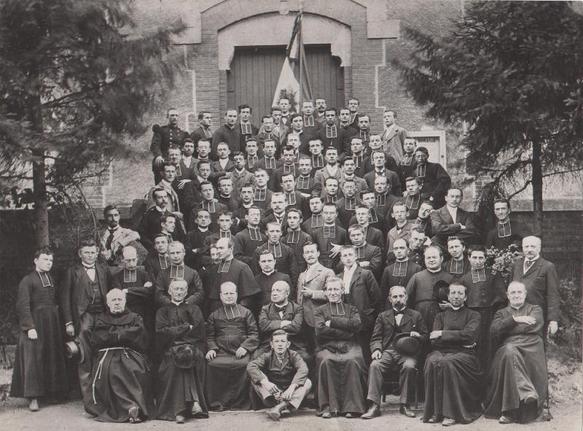 Val-des-Bois Social Congress (Dehon seated front row second from left) Val-des-Bois Social Congress (Dehon seated front row second from left)
The last years of the 19th century saw Leo Dehon’s involvement in the social apostolate peak. After 18 years of slow growth, the social conferences that started at St. Sulpice and continued at Val-des-Bois needed to be moved to St. John’s College in St. Quentin. The first of these, in 1895, was a “veritable congress,” notes Manzoni, “with two hundred priests from over thirty dioceses.” The topics discussed included education of the clergy, social action by the clergy, Christian democracy, and (Dehon’s favorite) “modern usury.” He wrote in his diary that “These are memorable days – ardent, shining and unforgettable. It’s a mini council, a council made up of youth… this mini congress will be influential in the reawakening of Christian social life in France.”
In May 1896 Fr. Dehon took part in the 3rd Congress of Workers’ Study Circles, as one of 600 delegates, and immediately after that in the congress of the Circle Movement in Paris. In August of that year, he was a doctrinal expert at a congress of 700 priests in Reims, at which every social problem was discussed in light of Pope Leo’s encyclicals. In that same month and city, he attended the Congress of the Franciscan Third Order in that same city, giving a presentation on usury, banks, industry, commerce and the evil effects of poverty. In December, he left for a four month stay in Rome, where he gave five lectures on the social question organized by the Assumptionists. While there, he had another audience with Pope Leo (along with Harmel and two others), and on his way back to France, he made stops in Milan and Bergamo to learn about the social works of the Catholic movement. In August 1897, Dehon was in Nimes for the fourth congress of the Third Order, and after a discussion on the subject of wealth, he co-authored a pamphlet, “Wealth: Moderate Means or Poverty?” Using the Gospels and Rerum Novarum, they concluded that while voluntary poverty can be required for some who are specially called, the majority can only be asked to be good stewards of their wealth and not keep more than what is legitimate for their well-being. The following year the Third Order held an international congress in Rome with 15,000 participants. Despite Dehon’s and Harmel’s efforts, however, the congress explicitly stated that the Third Order is “not an organization to promote political economics.” This was a blow not only to them, but also to Leo XIII, who had wanted to see the Third Order focus on the social question. By 1897, Christian Democracy had reached its high-water mark, and in December of that year held its own congress in Lyons. But here too, Dehon and Harmel (who was a committee chair) were disappointed with a lack of follow-through, as enthusiasm was not matched by organizational commitment or financial resources, and rivalries and divisions undermined the movement. Dehon, like Harmel, eschewed all political involvement, but from 1897-1900 he couldn’t avoid it. The pope wanted to see Christian Democracy succeed, and Dehon’s good relationships with conservative Catholics, monarchists, and Rome made him an important bridge-builder between the groups. Despite his best efforts, though, in the general elections of 1898, right-wing and left-wing Catholics cancelled each other out, to the benefit of the radicals and Socialists. After six years of “détente” between Church and State, many religious had returned to their convents, colleges, and chapels, and Catholic works had flourished. All these results of the pope’s policy of rapprochement, however, would soon come to nothing. FOOTNOTES: [1] followers of the Minister of War, Gen. Boulanger, who had dreams of restoring the monarchy. |
Fr. Dehon and “The Social Question” (Part 4 - last in series)
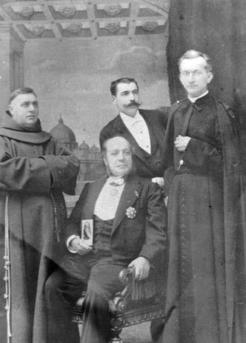 with Harmel in Rome with Harmel in Rome
After the Catholics' disastrous defeat in the general elections of 1898, radicals and Socialists in France gained power, and the six year “détente” between Church and State was over. Manzoni describes the clergy as having for the most part two reactions: “Some refused to give up their bellicose plans for overthrowing the Republicans, Jews and Masons. Others turned inward, anguished and discouraged… and took refuge in their ministry.” He also notes that “many of them were totally lacking in sensitivity to the social question, not from selfishness but from ingrained habit,” and that Dehon “suffered greatly” from their apathy and misunderstanding."
In 1895, in Dehon's introduction to Part II of the Christian Social Manual, he had written to his fellow priests, “We must go to the people! …those are the words of Leo XIII.” He insisted that they |
|
cannot remain
shut up in their churches and rectories….
It is not enough to bring the people words of instruction and
consolation; we must also attend to their temporal interests and help them to
organize institutions that can replace the guilds which are no more…. We must act without wasting time in sterile
discussions.
|
|
He continues
with a critique of a contemporary manual for priests which assumed that the men
of the day were past saving and encouraged a focus on women and children:
|
|
That
fainthearted generation changed Christ for us.
He was no longer the Christ of the workers, the Christ who carried out
His incessant apostolate among fishermen, tax collectors, people of the
world…. The Lion of Judah was
transformed into a timid sheep. Our
Christ… was changed into a fearful and weak human being, who spoke only to
women and children and sick people.
|
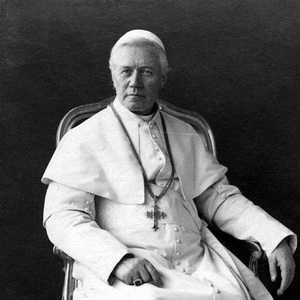 Pope Pius X Pope Pius X
There were, however, growing numbers of young priests who welcomed Rerum Novarum and wanted to “go to the people” and spread Pope Leo’s message. These “abbés democratés” (democratic priests) were not an organized body, but individually they had influence as journalists, public speakers, editors of periodicals, and in a few cases as members of parliament. Dehon is often mentioned as among their number. But the divisions between right-wing and left-wing Catholics deepened. Etienne Lamy, whom the pope had named (against Dehon’s and Harmel’s advice) to oversee the federation of Republican and Monarchist Catholics, was not a great leader, but Dehon steadfastly supported him nonetheless. Eventually, though, the failure of the factions to unite in the 1898 elections and an ill-advised intervention by the pope led to Lamy’s resignation and the federation collapsed.
Leo XIII’s 1901 encyclical Graves de Communi disavowed Christian Democracy’s role in the political arena, saying it was wrong to give the movement “a political meaning.” This was deeply disappointing to the Christian Democrats and many of the abbés democratés, but Dehon himself was reassured. “This direction was necessary,” he wrote. He felt that many of the democratic priests had been too compromised by politics. “Their generosity and love for the workers were admirable and their social analysis correct, but many of their methods were inappropriate or even wrong.” That same year, the social studies meetings for priests and seminarians at Val-des-Bois, having aroused strong opposition in some quarters, were discontinued. Fr. Dehon was present at the last one, on August 18-25, 1901. Though their closing was a “victory” for their adversaries, these social congresses had sensitized hundreds of young priests to the social question and brought them out of their sacristies and to the people. The year before, in 1900, Dehon published Christian Social Renewal, based on lectures he had given in Rome to audiences of hundreds, including many bishops and cardinals. The first five lectures expand upon The Christian Social Manual. He notes that a group of Catholics "most faithful to the papal directives and the most zealous supporters of Christian social action" were going by the name "Christian Democrats." Asking whether the word is "well-chosen," he proceeds to explain that Christian Democracy "is not pure or absolute democracy. We do not want to exclude all royalty nor even any aristocracy... we are not calling for the suppression of the employers or the proletariat." He notes that Rerum Novarum called "socially... for laws and institutions that are favorable to workers" and "politically... for a progressive rise through the ranks by the people and their increasing participation in public administration." The Christian Democrats are "not unaware" of some model employers like Harmel, but they are "not so naïve as to believe that employers will become excellent without the help of the law and action on the part of the unions." He adds that Christian Democracy does not go as far as pure democracy, which "excludes all class privileges," but that it "condemns the aberrations of capitalism" just as it "rejects the illusions of socialism." With the death of Leo XIII in July of 1903, Fr. Dehon's social apostolate, at least in its public aspects, greatly diminished. Dehon's source of papal social directives "dried up," as Manzoni puts it. Pius X was much more concerned with defending the Church’s religious interests than rapprochement with the Third Republic. He felt that Catholics should not be given more freedom in the secular sphere but instead take their direction solely from the hierarchy. The influence of the intransigents in the Vatican grew. In November 1903, Dehon decided to stop publication of his magazine The Reign of the Sacred Heart in Souls and Societies, which he had begun twelve years earlier. Afterwards, he contributed to other social journals, his longest association being with La Chronique du Sud-Est (the Southeast Chronicle). From 1898 through 1903, it carried a piece by him every month, and occasionally from 1904 to 1908. After 1908, his social apostolate was essentially finished. Why did Fr. Dehon so suddenly move from such intensive to so little engagement with the social question at this point? Manzoni says there is no proof that it was because of “orders from above,” as was alleged by Fr. Luigi Sturzo, an Italian priest active in the Christian Democratic movement in the 20’s. If Dehon had received a directive from the Vatican to “cease and desist,” Manzoni argues, he would not have continued relationships with those in the Catholic social movement, nor presented Marc Sangnier, whose “Sillon” movement revitalized the Christian democracy movement, to the Roman public in 1907, nor have had several political articles published, including his last major work, “Freemasonry in Italy and France” (1908), and never engaged in his 1910 re-working of the Christian Social Manual. Manzoni suggests "more plausible" reasons for Dehon’s cutting back on his social apostolate: |
|
|
On the eve of his 69th birthday in March of 1912, Dehon wrote a long letter to his religious, known under the title “Souvenirs.” Recalling his many social works - his numerous works at St. Quentin, the congresses in which he participated, and his social writings and lectures - he tells them, “I wanted to contribute to the uplifting of the lower classes, with the advent of justice and Christian charity.” He concludes: “in this area, too, the work must continue. The masses are not yet convinced that the Church alone possesses the true and practical answers to all social questions.”
|
